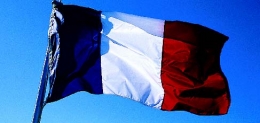Thierry Henry’s ‘main de dieu’ has been a thorn in the side of French society since that fateful night in Paris a couple of weeks ago. As an Irishman living in France, I’ve been inundated with apologies and commiserations from French friends and colleagues. I must admit I have been quite moved by the sense of fairness and sympathy French people have expressed towards Ireland.
As it happens, Henry’s infamous handball has in fact coincided with a national debate about French identity. The French have always been a nation given to introspection – and among the responses to the question of French identity, the values of human rights have come to the fore.
For the French, the revolution of 1789-1799 is a foundation stone of what it means to be French. But France has long ceased to be a revolutionary society. The riots of May 1968 were perhaps the last pathetic attempt to resuscitate French revolutionary consciousness, yet they amounted to little if not nothing. In fact, French socialism died that summer, and many of the 68ers would later prove to be among the greatest sell-outs and proselytisers in French history.
The Trotskyist Lionel Jospin is perhaps one of the most notable traitors of socialism. When France finally elected a socialist government under the stewardship of François Mitterand – himself a former collaborator with the Vishy regime during the Nazi occupation – the greatest privatisation programme in French history was launched. The Trotskyite dissembler Jospin called it “réalisme de gauche” (left-wing realism). George Orwell would have been proud!
Mitterand turned socialism on its head, sending military aircraft and warships to the Persian Gulf to be used against the Iranian people in the days when Saddam Hussein was a ‘friend’ of the west. His conduct in Africa was typical French colonialism with a ‘human face’ – the attitude of the French ‘socialist’-led coalition in the 1980s towards Africa’s most progressive leader Thomas Sankara is a case in point. In 1983 Sankara took power a revolutionary coup d’etat in the Republic of Upper Volta. His programme was to educate, feed and house all citizens of the former French colony, and he re-named the country Burkina Faso, land of the upright men.
Unlike Mitterand, Sankara didn’t just preach and waffle about socialism – he practised it. During his short reign, he promoted socialism, ecologism and feminism. He understood Africa’s problems and dedicated his life to solving them.
But the ‘socialist’ French government had always been less than enthusiastic about Sankara. In a state visit to Burkina Faso in 1984, President Mitterand warned Sankara that his socialism was going to far. In other words, France had many interests in the country which were threatened by Sankara’s reforms – such as the super-rich French minority who lived in luxury at the expense of Burkina Faso’s poor. Sankara’s reforms could conflict with their privileges, and such a threat to Burkina Faso’s plutocracy was a problem for the French ‘socialists’.
The tale had a tragic end in 1987 when Sankara was murdered in a right-wing coup d’état, led by his friend Blaise Compaore. Many in Burkina Faso suspected French involvement. And it would be hard to blame them, given the fact that subsequent French presidents have to this day greeted the murderer Compaore as an ally.
It is the same old story of hypocrisy and greed. The French nation changed the world in 1789, and changed it again, albeit briefly, in the Paris commune of 1871. These events marked France’s claim to greatness. But where are the philosophers today? Where are the revolutionary ideas and who will implement them? What has become of this once great nation that no longer understands what it came from, who it is and where it is going?
We live in a world where the liars and the cheaters win the greatest prizes. It is a world of capital rights – mere human rights are irrelevant. In this sense, Henry’s handball is indicative not only of the crisis in French identity, but is also a symbol for our corrupt capitalist world. It is the hidden hand of the market ruthlessly sticking down all hope of fairness and justice; the hand that steals as it gives; the hand of treachery.












